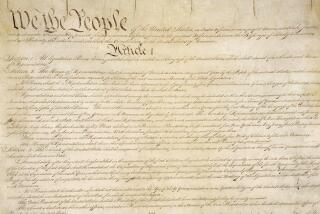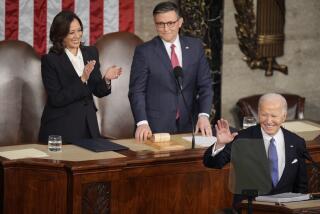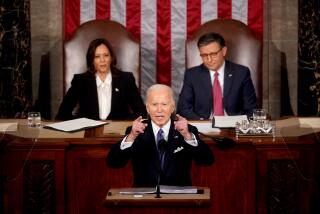Inaugural addresses, then and now
We consider ours a singular age of individual psychology and self-awareness. Isn’t it strange, then, that our recent presidents have had nothing either modest or insightful to say about themselves in their first inaugural addresses, while our earliest presidents in their earliest moments spoke openly of their failings, limitations and deficiencies?
In fact, the very first inaugural address -- George Washington’s in New York City on April 30, 1789 -- began with a personal apology. In a fashion inconceivable in a country no longer known for acknowledging its faults, our first president apologized to Congress for his unworthiness, referring to himself as “one who (inheriting inferior endowments from nature and unpracticed in the duties of civil administration) ought to be peculiarly conscious of his own deficiencies.”
This was the “father of our country” speaking, the former commander in chief of the Continental Army, who had steadfastly seen the American Revolution through to victory. And yet, having a strong sense of the limits of what one man could do as the head of a still modest-sized country, he began his presidency by raising doubts about himself.
Twelve years later, when Thomas Jefferson gave his inaugural address from the unfinished Capitol building in Washington, he took up similar themes. The principal author of the Declaration of Independence, the former governor of Virginia, the former secretary of State and vice president professed “a sincere consciousness that the task is above my talents, and that I approach it with those anxious and awful presentiments which the greatness of the charge and the weakness of my powers so justly inspire.”
James Madison acknowledged his “deficiencies” in 1809. Eight years later, James Monroe insisted that “conscious of my own deficiency, I cannot enter on these duties without great anxiety for the result.”
How curious and archaic such sentiments seem today, highlighting as they did humility and denigrating ability.
It’s hard to imagine a recent president saying, as Jefferson did of the task ahead, “I shrink from the contemplation, and humble myself before the magnitude of the undertaking.”
Today, all this would stink of weakness and so be taboo.
By the time John F. Kennedy came along, there was no more talk of shrinking from contemplation. “In the long history of the world,” he said in his inaugural address, “only a few generations have been granted the role of defending freedom in its hour of maximum danger. I do not shrink from this responsibility -- I welcome it.”
Recent presidents have regularly outlined grand ambitions, celebrating strength, threatening enemies and hitting the call notes of an ever more imperial presidency. Underneath the often dull words of modern inaugurals lies a distinct hubris, an emphasis on the potential limitlessness of American power.
In his second inaugural address, George W. Bush, after raising the warning flag of “our vulnerability” and our need for security beyond compare, pledged nothing less than to bring “freedom” to the whole planet. He identified this as “the urgent requirement of our nation’s security, and the calling of our time ... with the ultimate goal of ending tyranny in our world.”
Only one president in recent memory offered a shred of the modesty that the first presidents exhibited. Jimmy Carter’s 1977 inaugural address, coming in the wake of Watergate, the Nixon presidency and the disaster of Vietnam, called Americans to “a new spirit,” a new way of thinking about the country, which was to include a recognition of “our recent mistakes” and a realization that “even our great nation has its recognized limits, and that we can neither answer all questions nor solve all problems.”
Only Carter, of all our modern presidents, picked up on the theme of personal limits. “Your strength,” he told Americans that January day in 1977, “can compensate for my weakness, and your wisdom can help to minimize my mistakes.”
It didn’t play well. After only one term, Carter was soundly thumped by Ronald Reagan, a candidate who saw no limits to America.
Looked at another way, Washington and Jefferson had an advantage over recent presidents. The country they were to lead was still an experiment that its creators knew could go wrong.
Our earliest presidents had the modesty of uncertain beginnings to guide them, just as we now have the immodesty of a government that garrisons much of the planet to guide us. They were called on to lead a new nation that was still militarily weak, whose capital, only 13 years after Jefferson doubted himself in public, would be sacked and burned by British troops. They were under oath to a country whose existence, recently wrested from the great imperial power of its day, was still a kind of fragile miracle.
We have just lived through a commander-in-chief presidency whose oppressive power and overwhelming hubris would undoubtedly have left those early presidents in shock, if not revolt. They would have seen George Bush’s world -- in which strength was the byword of power and weakness an anathema -- as the scion of European autocracy. These were, after all, men wary of armies and military power, who had sacrificed the very idea of executive strength to a tripartite form of government that would, they hoped, have the advantages of resiliency and responsibility. They recognized limits.
Let’s hope that Tuesday, in his first moments, Barack Obama will do the same and so sound a lot more like the president of these imperiled United States -- and a lot less like the autocrat of the planet.
Tom Engelhardt runs the Nation Institute’s TomDispatch.com, where a longer version of this article, including a proposed inaugural address for Barack Obama, appears.
More to Read
A cure for the common opinion
Get thought-provoking perspectives with our weekly newsletter.
You may occasionally receive promotional content from the Los Angeles Times.






